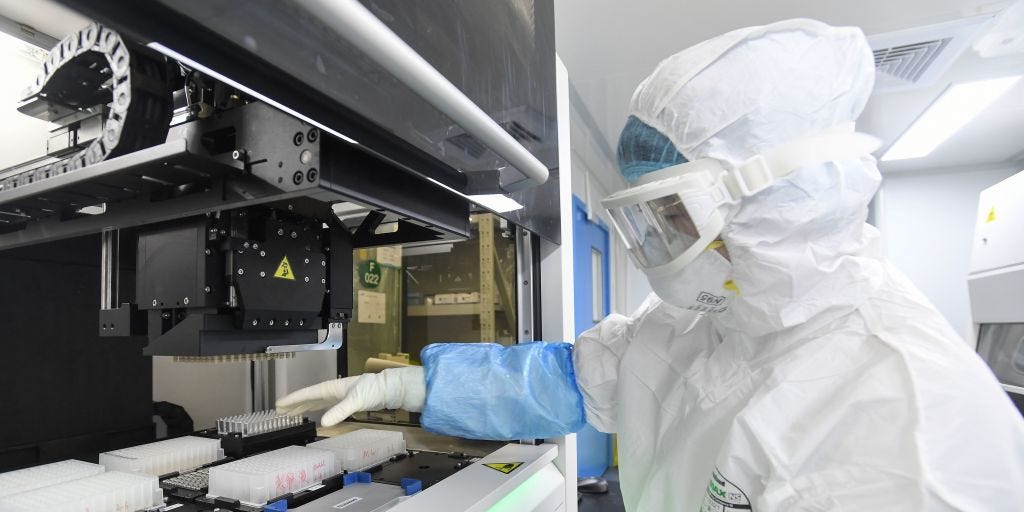- The UK government reportedly believes the coronavirus outbreak may have started in a Chinese laboratory.
- Most experts believe the outbreak began when animals passed the virus to humans in China, specifically in or near a market in the city of Wuhan where live animals were sold.
- Some scientists, however, believe an accidental leak is a plausible alternative theory — and the Mail on Sunday said UK officials were not ruling it out.
- A UK parliamentary committee last week accused the Chinese government of spreading disinformation about the origins of the virus.
- "Perhaps it is no coincidence that there is that laboratory in Wuhan," one UK government official told the Mail on Sunday.
- Visit Business Insider's homepage for more stories.
The UK government believes the novel coronavirus may have accidentally leaked from a laboratory in the Chinese city of Wuhan where scientists were researching viruses, according to a Mail on Sunday newspaper report.
Most experts believe the outbreak of the virus began with animals passing the disease to humans in or near a market in the Chinese city of Wuhan where live animals were sold.
The Mail on Sunday report, however, says that while officials in Prime Minister Boris Johnson's government believe this is still the most likely explanation, it is "no longer being discounted" that a leak from a nearby laboratory actually caused the outbreak.
"There is a credible alternative view [to the zoonotic theory] based on the nature of the virus," a member of the UK government's emergency committee of senior officials, Cobra, told the newspaper. "Perhaps it is no coincidence that there is that laboratory in Wuhan. It is not discounted."
There are two scientific labs close to Wuhan where scientists are believed to have been carrying out tests on viruses: the Institute of Virology and the Wuhan Center for Disease Control.
Both are within 10 miles of the animal market where the outbreak is widely believed to have started late last year.
Some scientists in the US believe an accidental laboratory leak is a plausible theory, The Washington Post columnist David Ignatius said last week.
One biologist Ignatius pointed to was Richard Ebright, a professor at Rutgers University's Waksman Institute of Microbiology.
Ebright was quoted in the Bulletin of the Atomic Scientists as saying many of the scientists in Wuhan who had been researching viruses had only "minimal protections" against infection.
"Virus collection, culture, isolation, or animal infection at BSL-2 [moderate biosafety level] with a virus having the transmission characteristics of the outbreak virus would pose substantial risk of infection of a lab worker, and from the lab worker, the public," he said.
He went on to say the evidence available left "a basis to rule out a lab construct, but no basis to rule out a lab accident."
In other words, while the virus was not believed to have been created in a lab, it could have been studied in one and released in an accident.
Pippa Fowles/10 Downing Street/Handout
Johnson's government has reportedly started to question the veracity of China's statements regarding the coronavirus.
Last week it was reported that UK officials were furious with the Chinese state.
On March 29, the senior UK lawmaker Michael Gove told the BBC he was skeptical of China's official virus numbers.
"The first case of coronavirus in China was established in December of last year, but it was also the case that some of the reporting from China was not clear about the scale, the nature, the infectiousness of this," he said.
A report by the UK Parliament's Foreign Affairs Committee last week accused the Chinese government of spreading disinformation about the spread of the virus.
"Disinformation about COVID-19 has already cost lives," the committee said.
"It is essential that the Government issues clear and transparent messages at home to confront and rebut disinformation spread by foreign powers."

























